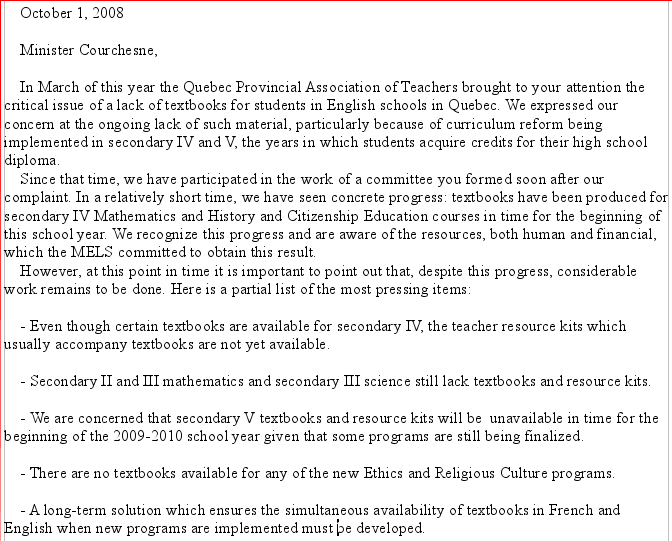
Apparently Quebec teachers have it made. We have 20 pedagogical (PED) days throughout the school year. Quebec public school teachers work 200 days, 180 of which are teaching days spent with kids.
School’s out, and parents wonder: Why so often?
Quebec teachers have more than those in any other province; say they’re essential
BRENDA BRANSWELL, The Gazette Published: Wednesday, September 24
Reader response to the article (and these are some of the…nicer…ones):
…I understand that teachers need a few days to learn new material and teaching techniques but do they really need so many of them when they have 2 weeks off in December and 1 week at March break? I know of one school that has 4 ped days in November…. 4 days!! Whats that all about? Cut out the field trips, movie watching and general time wasting in school and teach the kids instead. As ZORA wrote, if we had an excellent public education system then okay, but out kids aren’t doing as well as kids in other provinces.
…I’m a teacher and all I’d like to say is that we may have 20 ped days, more than any other province, however, every other province has a set of province-wide standards and curriculum. Québec has no such curriculum. Our curriculm is teacher-created. On ped days, teachers meet with other teachers and not only decide but also create what they will teach next. Parents should inform themselves before criticising their child’s teacher. Parents should also be reminded that school is NOT a daycare. I am so insulted by all these comments for all the care I put into teaching my students. Thank goodness we are rewarded everyday from our students, because adults often seem to forget just how much we do for their children.
Yup, we sure have it made.
Oh, by the way…were you aware of the reform? Or, as it is has started to be called by the Education Minister Michelle Courchesne, Pedagogical Renewal?
This year is the first year that English schools in Quebec have received teaching materials in English for the new courses that are mandated under Pedagogical Renewal in Quebec. Last year our grade 8 (Cycle 1, year 2) teachers received the History and Citizenship student course books in May. For real.
Quebec delivers Grade 10 textbooks
History, Math. Courchesne promises she’ll do even better for English students in September ’09 BRENDA BRANSWELL , The Gazette Published: Friday, August 29, 2008
If you read the article above you will notice that not all of the materials have been made available and that no teacher guides have been made available. The Honourable Minister Courchesne is happy that 2 math texts and one science text have been made. The texts are meant to cover the curriculum up until January – assuming that everyone teaches the same parts of the curriculum at the same time of the year. The other high school in our district teaches their courses intensively over one semester – not very helpful for them. She neglected to mention that there are 3 math courses offered in Sec. IV (aka grade 10, now known as Cycle 2, year 2) In fact, some Sec. III courses (aka grade 9, Cycle 2, year 1), which were taught for the first time last year still do not have teaching materials available in English to support these courses.
Imagine teaching without curriculum.
This could be a very good thing. If one wanted to design curriculum for their students, if the courses being taught were not subjected to standardized testing in the form of 2-3 week long Evaluation Situations (ES) at the end of the school year.
It could also be a good thing if each teacher were teaching one course at one grade level. Personally I teach English, Math, History (to be replaced by Economics in January), Ethics and Religious Culture (formerly SIS, Student in Society) at two grade levels.
Last month the Quebec Provincial Association of Teachers (QPAT) wrote an open letter to Michelle Courchesne regarding text books for English schools in Quebec.

I am not alone in feeling that we are unprepared to teach our students. I am a constructivist teacher. I create learning materials based on the individual learning contexts in which I work each year. The learning contexts are a combination of student interests, abilities, and styles and course curriculum. All elements of the learning context, or environment, are essential to ensure that learning takes place.
Without curricular support, my task becomes quite enormous.
So, about those PED days… Even with 20 PED days scattered throughout the year (4 of which occur after the end of the student’s school year in June, 3 others are often used up for snow days – we do live in Quebec!) I scramble to design learning evaluation situations (LESs aka formative assessment), problems, worksheets, projects, learning how to report out to parents (we assess with a 5 point rubric, but must convert to % to report out to parents…no comment…), creating rubrics, writing IEPs, combing through 3 different grade levels worth of text books to find material that is suitable for the new Math course I teach… oh, and then the regular day-to-day lesson planning, correcting, communication with students and parents, collaboration with other teachers…
Yeah, we’ve got it made.
